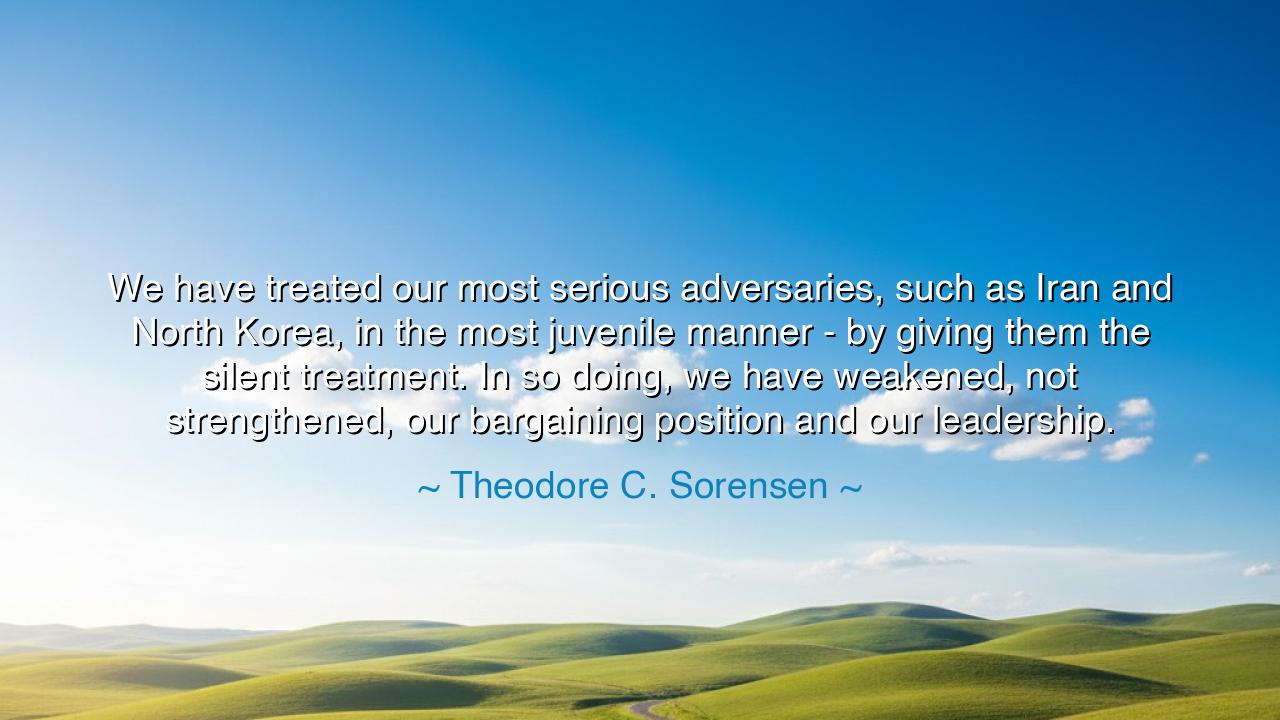
We have treated our most serious adversaries, such as Iran and
We have treated our most serious adversaries, such as Iran and North Korea, in the most juvenile manner - by giving them the silent treatment. In so doing, we have weakened, not strengthened, our bargaining position and our leadership.






“We have treated our most serious adversaries, such as Iran and North Korea, in the most juvenile manner — by giving them the silent treatment. In so doing, we have weakened, not strengthened, our bargaining position and our leadership.” Thus spoke Theodore C. Sorensen, the brilliant counselor and speechwriter to John F. Kennedy, whose words once helped guide a nation through the perils of the Cold War. In this quote, Sorensen strikes not only at the heart of diplomacy, but at the essence of leadership itself — the power to face conflict not with prideful silence, but with the courage of engagement. For to lead, one must not merely command; one must communicate, even with those one fears or despises.
Sorensen, who lived through the shadowed days of nuclear confrontation, understood that strength is not found in stubbornness, nor honor in avoidance. His words recall the wisdom that true diplomacy is not the art of isolation, but the art of understanding — the ability to transform enmity into dialogue, tension into equilibrium. When he condemns the “silent treatment,” he speaks of a failure of maturity, a retreat from responsibility, a kind of national arrogance that confuses silence with superiority. To shun one’s adversary is not to show strength; it is to reveal fear.
The ancient masters of statecraft knew this truth well. In the courts of the East, wise kings sent emissaries even to their fiercest enemies. In Athens, Pericles taught that the greatest mark of civilization was the willingness to reason with those who opposed you. And when Rome sought to rule the world, it conquered not only with legions, but with letters — with the power to negotiate, persuade, and bind through words. The silence of nations, Sorensen warns, is the silence before misunderstanding, before escalation, before war. For when men stop speaking, they stop seeing each other as human — and that is when calamity begins.
He speaks, too, to the deeper nature of leadership — whether in nations, in communities, or in the soul. To lead is not to hide behind walls of pride, but to step into the arena of conversation, even when that conversation is uncomfortable. When Kennedy faced Nikita Khrushchev during the Cuban Missile Crisis, Sorensen stood by his side. The world teetered on the edge of annihilation, yet Kennedy refused the silence of hostility. He opened channels of communication, sought to understand his adversary, and in doing so, averted war. This was not weakness — it was the highest form of strength: the strength to talk when others would have struck.
Sorensen’s rebuke of the “juvenile manner” is therefore a call to maturity, both political and moral. He reminds us that great powers — and great people — cannot behave like children, turning away in anger when faced with challenge. The leader who refuses dialogue isolates himself not only from his enemies but from wisdom itself. In silence, he loses insight; in engagement, he finds opportunity. To speak, to listen, to understand — these are not signs of compromise, but of confidence. Only the insecure cling to silence; the wise know that speech is the weapon of peace.
Yet Sorensen’s message extends far beyond the halls of diplomacy. In every human relationship — between friends, families, and nations — silence breeds decay. When pride replaces communication, love withers, and misunderstanding takes root. Whether in the affairs of nations or the bonds of the heart, reconciliation begins not with victory, but with dialogue. The path to peace, he teaches, begins with the simple courage to speak truthfully, and to hear without hatred.
Therefore, let this be the lesson we carry from Sorensen’s wisdom: silence is not strength — connection is. To lead wisely is to speak bravely, even to those we distrust. To withdraw into pride is to abandon the moral authority that gives leadership its light. Seek understanding, even when it is hard. Open the door to conversation, even when your enemy stands on the other side. For in that opening, history has found its greatest mercies — and humanity its most enduring peace.
And so, as Sorensen once stood beside a president who chose words over weapons, may we too learn that the measure of true power lies not in the silence of isolation, but in the voice of reason. Let our generation, and all those that follow, remember this eternal truth: Leadership is not the absence of dialogue — it is its mastery.






AAdministratorAdministrator
Welcome, honored guests. Please leave a comment, we will respond soon